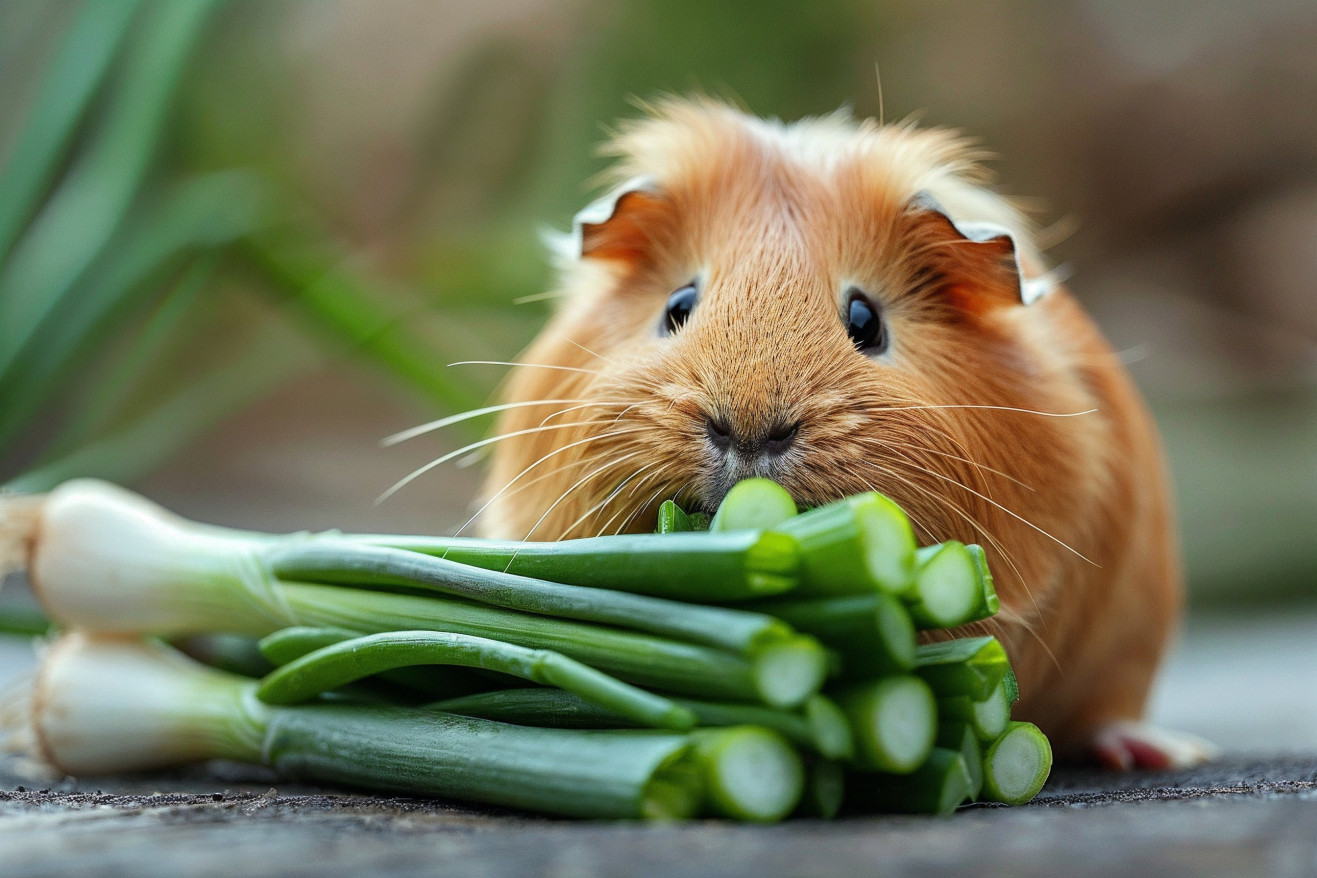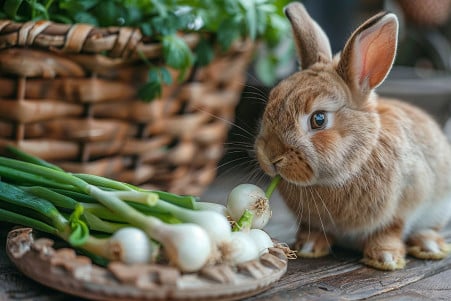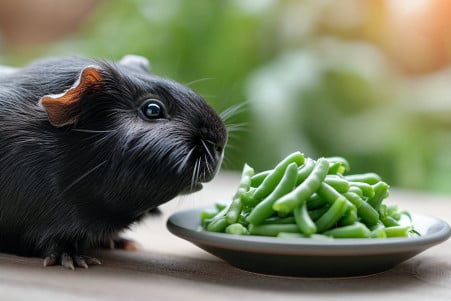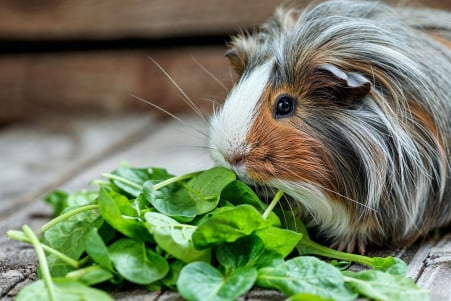Can Guinea Pigs Have Green Onions? The Science
3 April 2024 • Updated 2 April 2024

Guinea pigs can have green onions in moderation, but it's important to know their dietary requirements and the potential dangers so you can make sure your pet is as healthy as possible. While guinea pigs can have the green part of the onion plant, which includes chives and scallions, the bulbs contain sulfuric compounds that can cause digestive issues for guinea pigs. Green onions do contain some vitamin C and minerals, but they should be a small part of a diet that's primarily based on hay.
To help you determine whether or not green onions are a good occasional treat or snack for these cute little animals, we've taken a deep dive into the science behind guinea pig nutrition and digestive systems. This in-depth analysis covers veterinary research, nutritional information, and input from experts so you can feel confident in the choices you make for your guinea pig's diet.
Can guinea pigs eat green onions?
Meeting Guinea Pig Nutritional Requirements
Guinea pigs are herbivores, which means they eat only plant-based foods. According to the PDSA, this means they need a diet that's high in fiber to keep their digestive system healthy and reduce the risk of gut stasis. That's why it's important to make sure they have a constant supply of fresh hay or grass, which will help them get the roughage they need to keep their teeth from overgrowing and keep their digestive system working properly.
In addition, guinea pigs can't make their own vitamin C, so they need to get it from their diet to avoid scurvy, according to PetMD. This is why fresh greens and vegetables that are high in vitamin C are also important.
To make sure your guinea pig is getting everything they need, Oxbow Animal Health suggests a diet that's made up of about 70% high-quality grass hay, 20% uniform food (pellets), and 8% fresh vegetables and leafy greens. When it comes to the 8% that's made up of vegetables, 85-90% should be leafy greens like romaine lettuce, kale, and bell peppers, while only 10-15% should be root vegetables like carrots and parsnips, which are higher in calories and sugar. Making sure your guinea pig gets this balanced, fiber-filled diet is essential to making sure they get the nutrition and digestive support they need.
How Vegetables Fit Into a Guinea Pig's Diet
Fresh veggies are an important part of a guinea pig's diet and offer essential vitamins, minerals, and fiber. According to the Humane Society of the United States, the majority of the veggie portion should consist of leafy greens, such as romaine lettuce, red and green leaf lettuces, mustard or turnip greens, cabbage, kale, cilantro and parsley, and should total 1/2 to 1 cup per guinea pig per day. Red or green pepper and broccoli are also good daily options due to their high vitamin C content.
The Southern California Guinea Pig Rescue also lists cucumbers, tomatoes, and zucchini as daily options. However, high-calcium veggies, such as dandelion greens, spinach, and kale, should only be given once a week to avoid bladder stones, according to the Humane Society. Gas-producing veggies, such as cabbage and broccoli, should be introduced slowly and in small amounts.
It's important to offer a variety of veggies, and many experts recommend rotating 3-5 different veggies a day to ensure a well-rounded diet. This way, you can be sure that your guinea pig is getting the vitamins, minerals, and fiber they need to stay healthy.
The Dangers and Benefits of Green Onions for Guinea Pigs
The green part of green onions can offer some nutritional value for guinea pigs, including vitamins, protein, fiber, and healthy fats, says Pet Keen. On the other hand, the white part of green onions is toxic and should never be fed to guinea pigs because it contains sulfur compounds that can cause hemolysis, or the rupture of red blood cells, according to Oxbow Animal Health.
Consuming too many green onion tops can also cause digestive problems, such as diarrhea, in guinea pigs, according to GuineaDad. Because of this, it's important to feed green onions in moderation, with most experts suggesting a small handful once or twice a week at most. It's also important to watch for any negative reactions when introducing a new food, such as green onions, to a guinea pig's diet.
How to Feed Fruits to Your Guinea Pig
According to The Spruce Pets, guinea pigs can eat a variety of fruits, including apples, bananas, berries, and melons, in small amounts. However, because of their high sugar content, fruits should be fed sparingly and only as an occasional treat to avoid obesity and diarrhea, according to GuineaPiggles.
As a general rule of thumb, a piece of fruit the size of 1-2 grapes is a good portion size for a guinea pig and can be fed to them once a day or every few days, at most, says Small Pet Select. Avocados, rhubarb, and tomato leaves are toxic to guinea pigs and should never be fed to them.
Because fruits can be a good source of vitamin C and other important nutrients, they can be a healthy addition to a guinea pig's diet. However, fruits should never make up more than 2% of a guinea pig's diet to avoid health problems, according to The Spruce Pets. So, it's important to make sure your guinea pig's diet is well-balanced and consists primarily of hay and vegetables with only a small amount of fruit.
How to Create a Healthy Feeding Schedule for Guinea Pigs
A healthy feeding schedule is important for maintaining your guinea pig's health. According to Anti-Cruelty, guinea pigs should always have access to fresh hay or grass to support their natural grazing habits and keep their teeth from getting too long.
In addition to the hay, guinea pigs should be given fresh vegetables every day, and these should be spread out over several feedings. Omlet recommends one cup of fresh vegetables per guinea pig per day. A mix of leafy greens, peppers, and other vegetables will ensure that your pet gets the vitamins, minerals, and fiber that they need.
Guinea pig pellets can also be given to your pet to supplement their diet, and Guinea Pigs Australia suggests giving them 1/4 to 1/3 cup per guinea pig per day. These pellets can help make sure that your pet gets all of the nutrients that they need. Make sure that your guinea pig always has access to fresh water, and change it every day.
You should also make sure that you're keeping an eye on your guinea pig's health and adjusting their diet as needed. This can be based on their age, how much exercise they're getting, and other factors. However, creating a consistent, healthy feeding schedule will help you make sure that your pet is getting everything that they need.
Conclusion: Finding the Right Diet for Your Guinea Pig
Guinea pigs have unique dietary needs that must be met to ensure their health and well-being. While green onion tops can offer some nutritional value, it's important to use them sparingly to avoid digestive upset and other health issues. A diet that's based on high-quality hay, with the addition of fresh vegetables, limited fruit, and a small amount of pellets, is best.
Owners should also be sure to monitor their guinea pigs closely and introduce new foods slowly to avoid any adverse reactions. By learning about the potential risks and benefits of different foods, pet parents can make informed decisions about the best diet for their guinea pigs.


